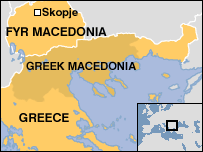
BY ISIDORA STANKOVIC:
“What’s in a name?” laments Juliet. “That which we call a rose by any other name would smell just as sweet.” To the lovers in Shakespeare’s famed tragedy, names represent cruel barriers to love that are ultimately meaningless. However, to the citizens of the small Balkan country ofMacedonia and Greece, a name stands for much more.
Macedonia and Greece have exhibited a tense relationship in recent years due to the dispute regarding the country of Macedonia’s official name. According to Balkan Insight, the name the Republic of Macedonia, the preferred name for Macedonians, is the main reason for the argument. The northern region of Greece is called Macedonia, and to Greeks the name the Republic of Macedonia implies that Macedonians have an eye on northern Greek territory.

The country’s name is so contentious not simply for territorial reasons, but also because it connects to the deeper elements of Greek and Macedonian identity. For example, Greece has protested Macedonian use of symbols such as the Vergina Sun and their claims that Alexander the Great hails from Macedonia and not from Greek Macedonia. In this context, the name debate then is simply an extension of historical territorial struggles and the endeavor to establish unique national identities.
As of now, Greece and Macedonia have come to the agreement that Macedonia shall be called the Former Yugoslav Republic of Macedonia (FYROM) for the interim. Under this title, FYROM gained entrance into the UN, but attempts to join NATO and the European Union have been halted due to Greek and Macedonian agreements regarding naming.
Isidora Stankovic ‘16 is in Timothy Dwight College. She covers a Balkans beat, focusing on current events in Serbia, Bosnia and Herzegovina, and Croatia. Contact her at isidora.stankovic@yale.edu.